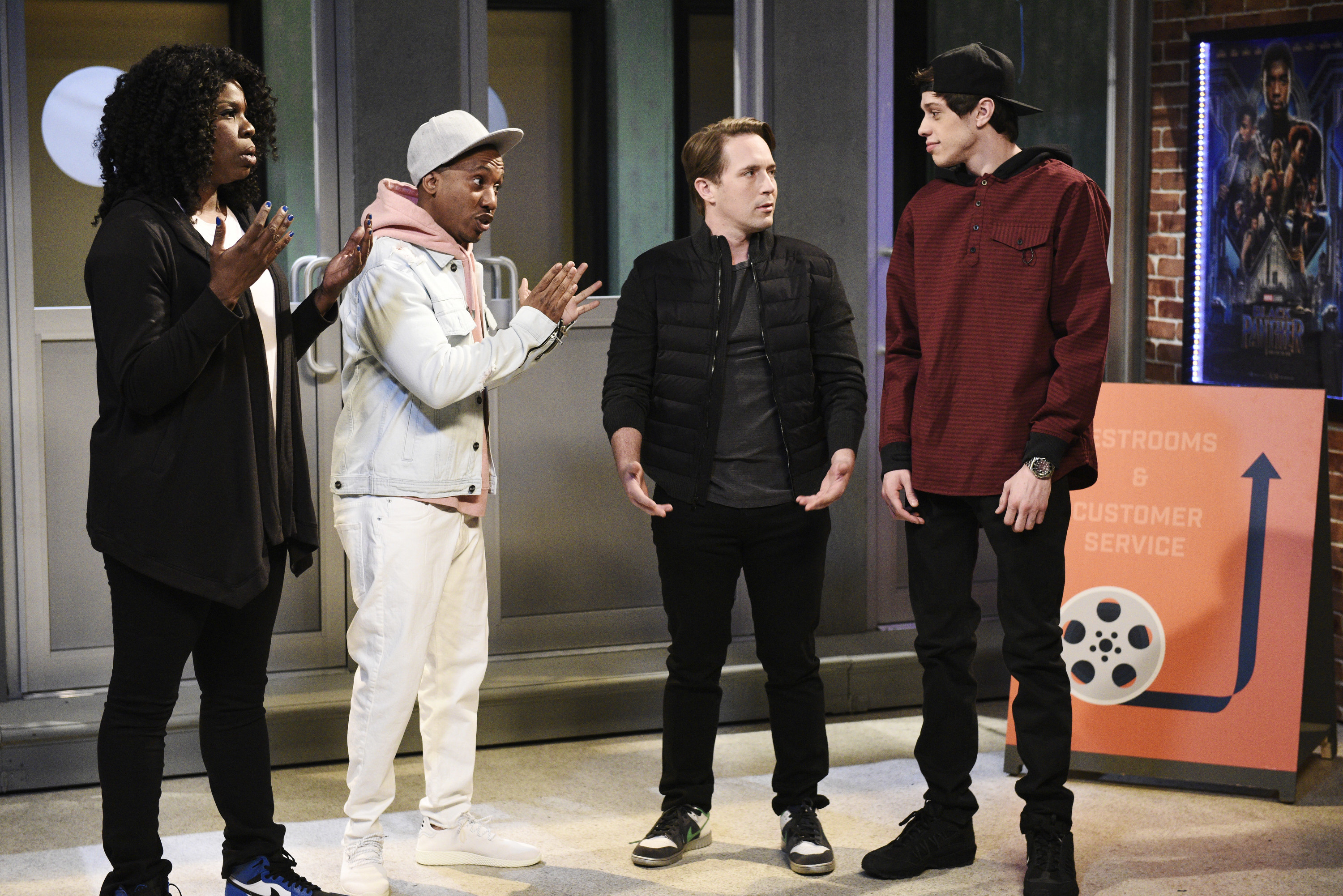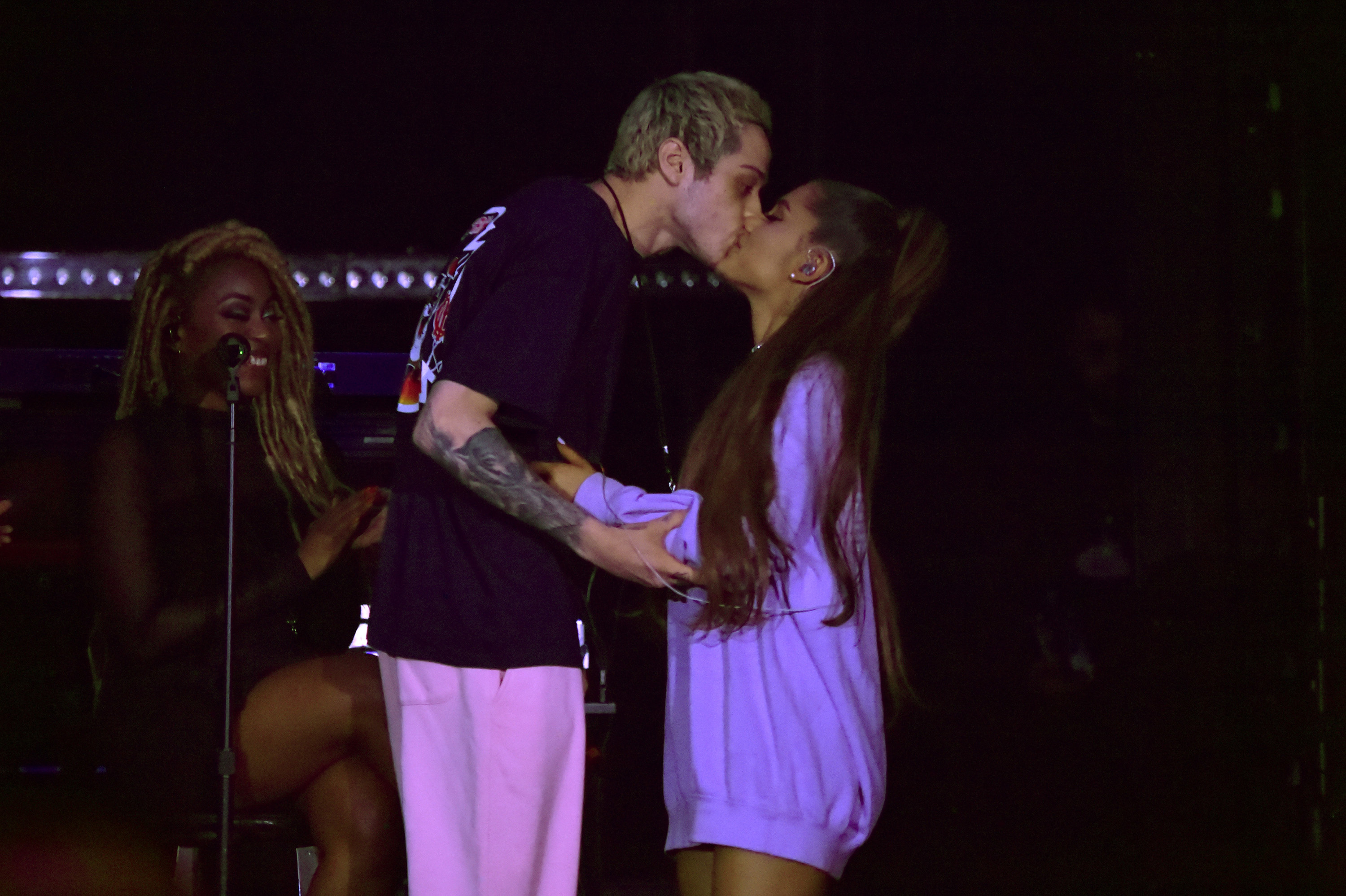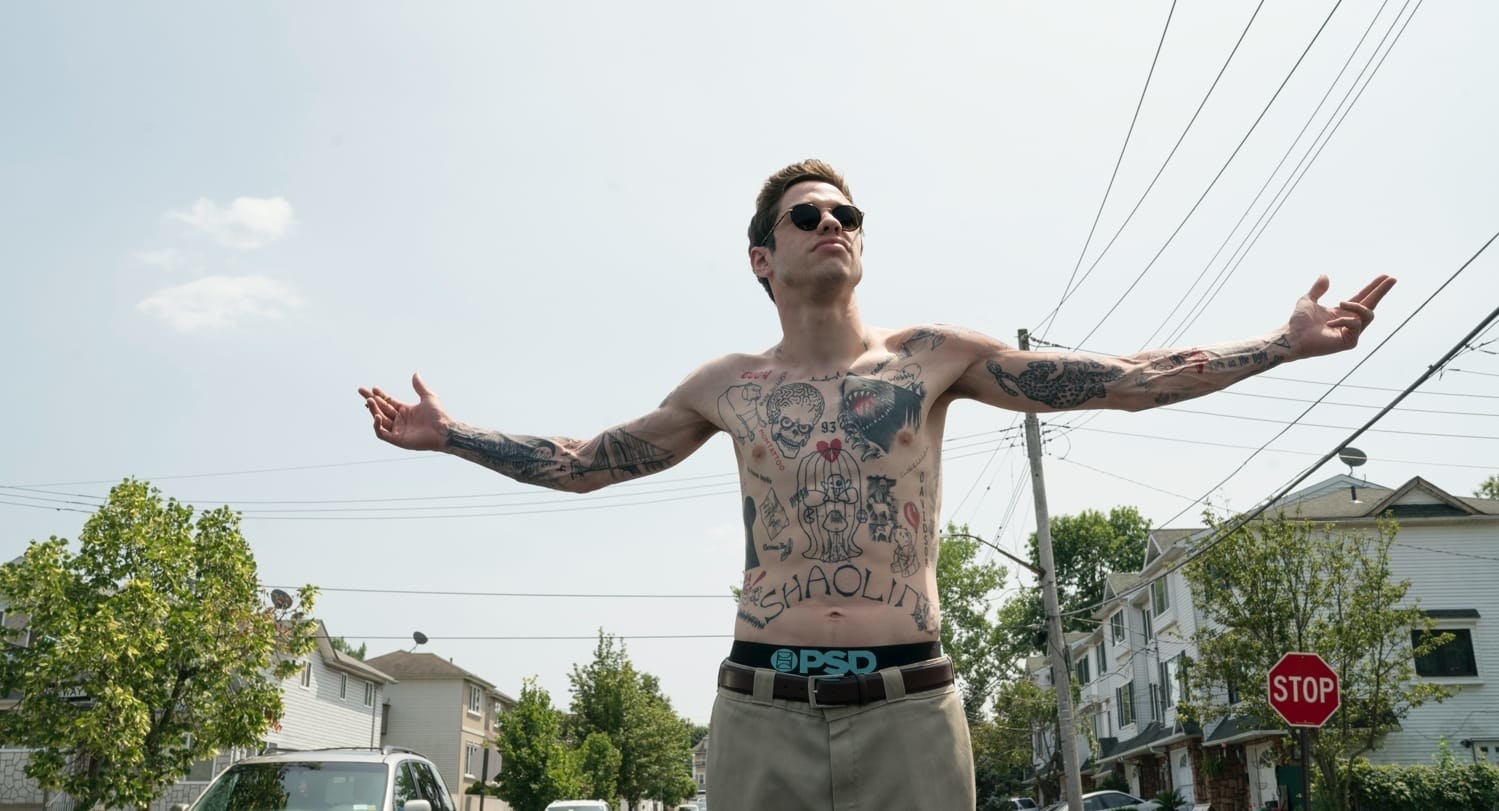It’s a shame that the name “Pete Davidson” is now synonymous with the name “Ariana Grande.” I can’t imagine dating someone in my mid-twenties for a few intense, absurd months, and then having that relationship die like a star burning through its own fuel supply, only after it’s come to define a significant portion of my public persona.
Davidson became one of the most overexposed celebrities of 2018, the face of Big Dick Energy and the boyfriend of a few other famous women. But the tabloid coverage from those relationships clearly got to Davidson, despite the fact that he’s plenty talented in his own right.
Though he has continued appearing on Saturday Night Live and released a Netflix stand-up special in February, he has avoided social media almost entirely and has refused most press interview requests (through representatives of his movie, he declined to speak with BuzzFeed News). And in 2019, he moved back to Staten Island, where he grew up, to live in the basement of a house he bought with his mother.
But on Friday, he’s releasing his biggest project yet: The King of Staten Island, a comedy-drama directed by Judd Apatow and written by Davidson, Apatow, and Davidson’s best friend, Dave Sirus, and available on demand. The movie marks Davidson’s first starring role in a feature film and is demonstrably semiautobiographical. Davidson plays the lovable but frustrating Scott, a man in his mid-twenties, stuck in arrested development after his firefighter father dies while saving someone on the job. He aspires to be a tattoo artist, but like his friend says, his work is “mad inconsistent.” He’s sweet and easy to root for, but he’s an idiot. When he attempts to tattoo a 12-year-old he runs into on the beach, he ends up setting up his widowed mother/roommate (played by an upsettingly hot Marisa Tomei in a very Long Island mullet) with yet another firefighter (Bill Burr). The King of Staten Island isn’t Davidson’s first attempt to become something more than a famous boyfriend, but it is his best work thus far.
At just 26, Davidson has lived more than a few lifetimes. He’s been the son of a hero, a celebrity accessory, an asshole, and a self-described crazy person. Yet he still manages to be appealing, charming, and lovable, even if it’s not always clear why. With The King of Staten Island, Davidson finally has the room and the self-awareness to present a fuller version of himself. It’s too simple to paint him as nothing more than a traumatized son who is still grappling with the loss of his father, or to suggest he’s just another white-guy comedian who doesn’t know where and when to punch. In Staten Island, he shows that he’s both and a whole lot more.

Davidson grew up on Staten Island, the oldest child of a firefighter father, Scott, and mother Amy, whom he references often in his stand-up and SNL appearances. His father was last seen entering one of the towers on 9/11, and that tragedy has had a defining effect on Davidson, who was just 7 years old when it happened. At 16, Davidson started doing stand-up at a Staten Island bowling alley, when friends convinced him to after Davidson had smoked a joint. “It went all right,” he told SFGate in 2015. His early stand-up was pretty juvenile: He told jokes about his penis, his eagerness to have sex, and how he was young enough to consider a 21-year-old woman a “cougar.” Certainly not the work of a comedy savant, though these are topics that remain steadfast in his work.
At just 21, he got a cameo playing a pothead who ends up in the hospital in Trainwreck because Amy Schumer recommended him to Judd Apatow. As a result of that cameo, SNL alum Bill Hader suggested Davidson to executive producer Lorne Michaels. “It was a real good moment for old Petey,” Davidson told the New York Times last week. “It was going to Six Flags and they’re like, the line is 15 hours for this ride. And then one guy just goes, ‘I can take you to the front.’”

He’s been on the show since 2014 and is one of the show’s youngest cast members. Still, on Saturday Night Live, Davidson is an oddity. His range is pretty limited, which he absolutely knows. Like Jimmy Fallon before him, he has a total inability to keep a straight face in sketches, which is either adorable or obnoxious, depending on how much affection you have for sometimes off-putting personalities. His best work on the show is his “Weekend Update” monologues, which provide a brief moment where he gets to just be himself. There, he jokes about his family, his romantic relationships, and his career while also offering his thoughts on current events. While some of his segments are better than others, when Davidson hits, he really hits. “You can buy a Mustang but you have to say, ‘Henry Ford hated the Jews,’” he said about the debate over listening to R. Kelly in March 2019, in one of his “Weekend Update” segments that went viral. “The full sentence should be ‘Mark Wahlberg beat up an old Asian dude and I would like one ticket to Daddy’s Home 2, please.’ If it’s that important to you, then at least own it.”
He’s also open about his own mental health. In September 2017, he revealed that he had been diagnosed with borderline personality disorder. The next year in October, Davidson was tasked with explaining Kanye West’s unaired pro-Trump rant that occurred during the previous week’s episode of SNL. “A lot of people thought [Michael] Che should be the one to talk about Kanye, but we discussed it,” he says at the onset. “Che’s black, but I’m crazy, and we both know what side of Kanye is at the wheel right now.” Davidson’s mental health jokes get laughs, but they’re often nervous ones. “Being mentally ill is not an excuse to act like a jackass. I’m quoting my therapist, my mom, and my mailman,” he says in his Kanye segment. “One time I stopped taking my meds and I bit my mom. It’s all good. I bought her a house.”
A big chunk of Davidson’s appeal, especially to straight women, is that he appears damaged, sickly, and weird.
A big chunk of Davidson’s appeal, especially to straight women, is that he appears damaged, sickly, and weird. (A YouTube comment on one of his SNL appearances five years ago captures it best: “this dude [is] hot in a weird, slightly uncomfortable kinda way. I’m into it.” Which, yikes, same.) If his physical appearance was even slightly more attractive, he’d maybe get cast on Riverdale. Davidson’s sexy ghost appearance also seems to betray at least some information about his emotional state and health. He has Crohn’s disease and has been using weed for years to try to cope with chronic stomach pain. And there’s still the underlying trauma of his father’s death — when he was young, he ripped out so much hair that he was briefly bald. His mother told the Times in 2015 that he had become a “lab rat” for doctors studying the offspring of 9/11 victims. “It was sad how sad he was growing up,” Amy said.
But his sadness is all part of the appeal — which has translated into surprising comedic success. At his best, Davidson looks like the guy from your 11th-grade physics class who skateboards and sells weed but is somehow cool with everyone. (He used to have a tattoo that said “Jokes come and go but swag is forever” and currently has another of Pac-Man.) At his worst, though, Davidson looks like a sullen kid, with eyes sunken into his skull — Mad Max War Boy kind of stuff.
There’s no question that Davidson’s unlikely sexiness charmed Grande, who met him in 2016 when she was both the host and the musical guest on SNL. (They got together formally years later, in 2018.) It’s easy to imagine that the relationship was surreal for Davidson. A massive celebrity with a largely squeaky-clean image praising her boyfriend’s penis size in public is the kind of thing a Davidson-type comedian would ordinarily make fun of. The tabloid attention was relentless. But the PDA, the handholding, the constant Instagramming of each other was kind of sweet, the way watching two 16-year-olds fall in love with each other often is, even if it was obviously going to end in disaster.
The whole relationship was an exercise in sincerity — Grande wrote songs about Davidson calling him her soulmate, and he bucked against being too earnest by making stupid jokes. “She’s the number one pop star in the world and I’m that guy from SNL that everyone thinks is in desperate need of more blood,” he said on “Weekend Update” after their engagement was announced back in the summer of 2018. “If we break up — we won’t, we will — but in 10 years, there’ll be a song called ‘Pete Davidson’ playing on speakers at Kmart, and I’ll be working there.” (He also made a pretty shitty joke about switching her birth control pills that he was, appropriately, criticized for.)
At the end of his career, this relationship will be but a blip for the comic, but even two years after their breakup, he continues to be a source of pop culture fixation: There are Instagram fan accounts dedicated to him, Page Six and other tabloids still track his movements, and just last summer he made his fashion runway debut despite not being a model by trade. Davidson doesn’t like the attention. It’s hard, maybe, to display so much genuine love for someone in public, and to have that affection largely thrown back at you in a Vogue article about your breakup. “It was an amazing distraction,” Grande said about her engagement to Davidson in July 2019. “It was frivolous and fun and insane and highly unrealistic, and I loved him, and I didn’t know him.” In February, Davidson addressed the comments in his Netflix special, Pete Davidson: Alive From New York. “Can you imagine if I did that? My career would be over tomorrow,” he said. “If I spray-painted myself brown and hopped on the cover of Vogue magazine and just started shitting on my ex?”
Their public back-and-forths aside, there’s no question that the massive amounts of tabloid attention the relationship attracted affected Davidson’s career and personal life in the years that followed. For a while, he stopped being a comedian and instead became arm candy for Kate Beckinsale, and Kaia Gerber, and Margaret Qualley. He wasn’t in control of his public image; he was just a plot device.

It was in the years after his breakup with Grande that Davidson’s mental health seemed less like a winky punchline and more like a cause for real concern. “No matter how hard the internet or anyone tries to make me kill myself. I won’t,” he wrote on Instagram in December 2018 after their breakup. New York police eventually made contact with him for a wellness check as his social media became more concerning and more erratic. (Davidson also went from looking like this at 21 — a pretty average-looking young person with coiffed hair and a flannel shirt — to looking like this seven months ago — an only slightly better-looking version of what Christopher Lloyd looked like in Back to the Future.) In a “Weekend Update” segment with his friend and fellow comedian John Mulaney in early 2019, Davidson addressed some of his troubles. “I’ve been spending time with Pete to try to show him that you can have a life in comedy that is not insane, a sober, domestic life,” Mulaney said.
“After observing John’s life, I publicly threatened suicide,” Davidson says, cracking up. “I know I shouldn’t make that joke, but it is funny!”
Davidson also began talking more publicly about his borderline personality disorder. He’s been in and out of rehab for mental health issues and to address his constant weed-smoking, believing that his “blind rages” were because he was using too much. It was, he says, actually his BPD. “I’m always depressed, all the time. I have to constantly bring myself out of it,” he told Charlamagne tha God this past February. “I wake up depressed, but now I know my steps. It’s all about programming yourself to trick your brain.” Davidson’s acknowledgment of his mental health issues went far beyond the discussions you hear from a lot of other comedians — he could make a joke about it, sure, but he also talked about tangible ways to feel better. “If you think you’re depressed, see a doctor and talk to them about medication. Be healthy. Eating right and exercise can make a huge difference,” he said in a “Weekend Update” segment a few years before. “And finally, if you’re in the cast of a late-night comedy show, it might help if they, you know, do more of your sketches.”
Davidson’s acknowledgment of his mental health issues went far beyond the discussions you hear from a lot of other comedians.
His decision to be more open about his mental health issues is refreshing as it’s rare to see a celebrity being so honest about their struggles. But knowing how vulnerable he’s actually willing to be is also what made Alive From New York such a disappointment.
The special starts with a seven-minute bit about the time Louis C.K. got him in trouble on SNL for smoking too much weed at work, only for C.K. to face public backlash a few years later, when women coworkers said he masturbated in front of them. It’s notable because it gets at ego — Davidson’s, because he desperately wanted C.K. to like him as a young comedian just starting out, and C.K.’s, who sounds like a petty predator. In Davidson’s retelling, the young comic gets to be a little bit of a hero, finally.
But overall, the special isn’t very good because it betrays what makes Davidson compelling to watch in the first place. There’s no real vulnerability beyond a hard-set jaw when he talks about his ex-girlfriend, no softness, no edge of anxiety that makes him approachable. Davidson’s work truly sings when he’s able to dig into discomfort and find a joke that goes beyond insulting the woman he used to date. In his 2016 Comedy Central special Pete Davidson: SMD, for example, Davidson is dark and scathing. He mentions wanting to get a tattoo of his father’s initials — SMD — despite the fact that those initials also mean “suck my dick.” His friends advise against it. “You’re right, I shouldn’t. But then I thought about it. I can only win. If someone has the balls to bring it up to me, oh, I would win so fast. I will never lose,” he says. But Alive is navel-gazing and largely unfunny because Davidson seemed embittered and isolated.
The special wasn’t very well-reviewed. The New York Times called it “a debut that feels like a late-career effort, the kind of tossed together quickly to satisfy the terms of an ill-advised contract.” Vulture wrote that “Alive From New York is alternatingly sad and dishy, with long swings through resentful, naughty, vulnerable, and cavalier… As an hour of comedy, the work is not finished.” When Davidson acts like all the other shithead white-dude comedians around him, he fades into mediocrity, just another cranky boy who hasn’t worked through his trauma long enough to have a conclusion. But The King of Staten Island subverts all that you’ve come to expect from the comic.

I don’t recommend watching The King of Staten Island if you have any unresolved issues with your father. You will cry. Actually, if you have any feelings at all about your mom being lonely, or thinking you’re a fuckup, or being abandoned — Staten Island will have you all up in those emotions.
It’s a funny movie, but it’s also one where every inch of it is dictated by the loss Davidson experienced early in his life. “It’s an imagining of what Pete’s life would have been if he didn’t find comedy,” Judd Apatow said in a featurette released about the movie, one of the few bits of promotion they have done. The Davidson in King of Staten Island is inconsiderate and often selfish. He has few ambitions other than to open a tattoo parlor/restaurant. “It’s never been done before! Not even as a joke!” he says. “Ruby Tattuesdays. Where everyone’s welcome. Chicken and tattoos.”
“All anyone ever does is worry about you. You don’t get to act crazy your whole life just because Dad died. At least you got to know him,” his sister — played by Maude Apatow — tells him. Scott’s retort is actually pretty ruthless. “Well, you’re lucky you didn’t get to know him. That’s why you’re almost normal. If you got to know him, you would’ve got to know that he was the fucking coolest guy ever. That would’ve ruined the rest of your life.” It’s hard to tell who’s talking here: Pete or Scott?
The King of Staten Island is the natural progression for a comedian like Davidson. Many have made a version of this movie before him. Amy Schumer did it with Trainwreck, while Pete Holmes, Louis C.K., Tina Fey, and Aziz Ansari all had their respective marquee TV shows. Usually, this shift to produce more personal material happens when a comedian is in their thirties or forties, entering a more mature phase in their career and looking to not just explore a more serious side of themselves, but to also explain something integral about who they really are.
The only way for Davidson to make a movie like Staten Island was to find a collaborator who understood both the story and the inherent mental health risk Davidson would be taking in opening barely healed wounds. “It’s stuff I would share with my therapist,” Davidson told the Times. “But Judd really cares and the hard work that he was doing to find out about my life made me feel so comfortable.”
The King of Staten Island isn’t just a movie, but a justification for his behavior. “I would really like people to understand me,” Davidson told the Times. “It’s cool to get three minutes here and there on ‘Update,’ but you can’t really tell what type of person that is. What I wanted to do was have an 8 Mile moment where it’s like, here’s everything — say what you want.”

Movies like Staten Island — or 8 Mile, which gave insight into Eminem’s origins — usually require a fuller career behind a person, with a lot of material, mistakes, and context to work with. Eminem might have only been 30 when his movie came out, but he had four studio albums, stratospheric fame, and a complex and public family drama playing out in tabloids and in his music. Louis C.K. was in his forties before he got his own show, and Schumer had already done four seasons of Inside Amy Schumer before Trainwreck was released. Shia LaBeouf’s recent film Honey Boy also did the work of interrogating his boyhood trauma as a way to better understand him. This isn’t to say that Davidson is underprepared for a movie like this; rather, it just means he sped through a self-awareness process that usually takes comedians years to properly delve into, especially so publicly. He has, at times, been bumbling and foolish, but to offer a coherent and cogent explanation of your trauma before 30 is still pretty remarkable.
“I think that people are interested in his struggle,” Apatow says in the featurette. “They want to know, How are you doing? What happened to you?” Here, Davidson gets that chance, a way to unflinchingly look at his best and worst instincts.
“For some people, it’s triggering to see someone so honest. To say, ‘Hey, I’m really happy today,’ and on another day, you’re like, ‘I’m completely miserable right now,’” Apatow said to the Times. “Nobody tells the truth. Everybody wears a mask. When they do tell the truth, it’s a huge deal. And Pete is the exact opposite of that. He totally cracks the theory.” Finally, after years of being more and more open about his illnesses, playing down his relationships, and sometimes getting lost in it all, Davidson has a two-hour movie to plainly lay out his version of the truth. ●
